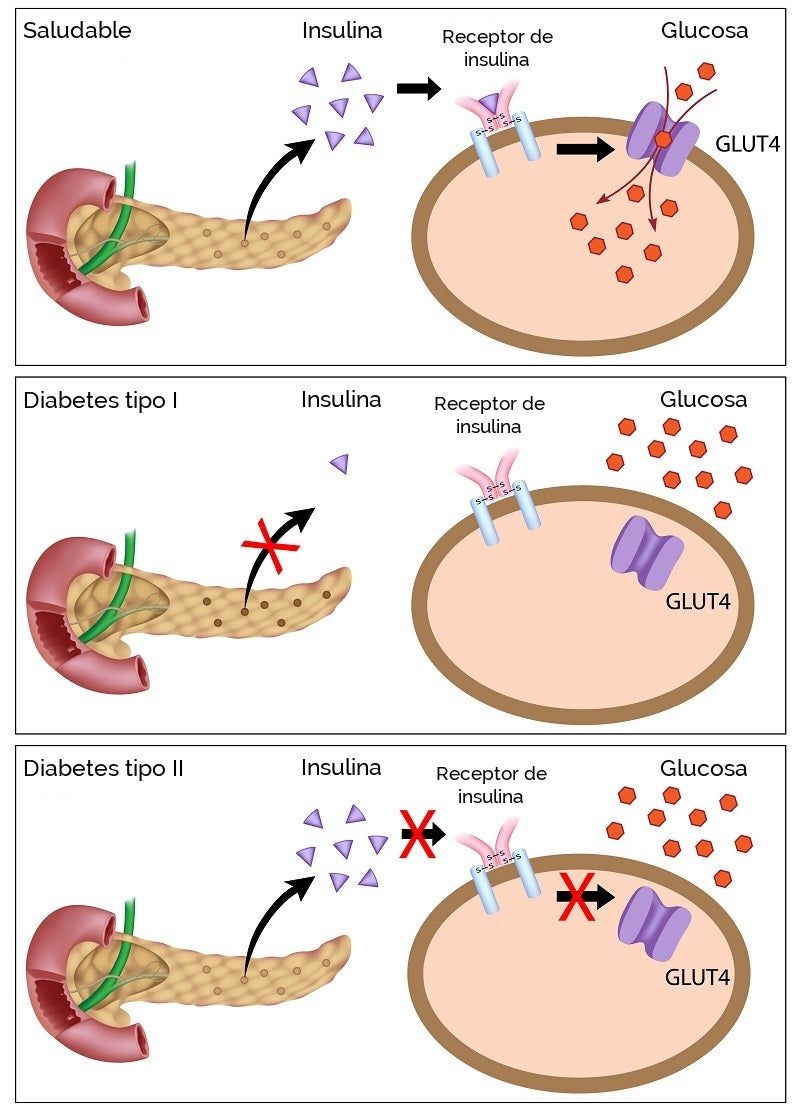
Although for many years the sugar has been present in our diet, today we see as one of the worst ingredients of modern life. The cause of this change of perspective are the harmful effects that the sugar has in our organism and that contributes to the appearance of different and very serious diseases.
What is sugar?
Sugar covers a variety of sweeteners that can be divided into Monosaccharides (such as glucose, fructose, and galactose) and sweetener complexes (such as sucralose, lactose, maltose, etc.). Sugar that we usually use is sucralose and is a carbohydrate that is found naturally in various plants, mainly in the sugarcane. Sucralose is made up of two types of simple sweetener: fructose and glucose.Problems caused by sugar
1. the added sugar affect teeth and provides no essential nutrients

This is one of the aspects that we hear more, but worth remembering it. The sweeteners added, like sucralose or high fructose corn syrup, contains a high percentage of empty calories, so do not provide any essential nutrients. We must remember that our body requires protein, essential fats, vitamins and minerals, but only sugar contains energy.
When people consume 10-20% of calories in the form of sugar can develop serious health problems and deficiency of nutrients. Also the teeth are affected with the appearance of tooth decay. This is because the sugar containing digestible energy particles that encourage the emergence and growth of bacteria in the mouth.
2. the added sugar is high in fructose and it can damage your liver
To understand the harm that sugar causes us we must first understand its composition. When sugar enters the digestive system is broken down into glucose and fructose. Vitally important glucose to the cells of all organisms on the planet and if we do not add it to our diet, our body can produce it naturally and in the amount required.At the same time, fructose can be produced naturally and is not necessary for our organism. Because of this, our body has difficulty to metabolize it when it is ingested in large quantity. When we take or eat a small portion of fructose (a piece of fruit), or just exercise not affects us too because it is converted into glycogen.
In this way it is stored in the liver to be used when we need it. The problem starts when the liver has too much accumulated glycogen, we are still eating too much fructose and it becomes fat, generating various health problems. It is important to remember that the fructose found in the fruit does not cause us damage, since their quantity is minimum and its origin in natural.
We must also take into account that people who lead a healthy life and remain physically active can better tolerate sugar than those who carry a Western diet rich in carbohydrates and calories.
3 overloading the liver with fructose can cause non-alcoholic fatty liver disease
When fructose is converted to fat in the liver also generates negative cholesterol. However, part of that fat stays and causes fatty liver. This has become a very serious problem in Western countries and is associated with metabolic diseases of all kinds. Some studies have shown that those who have fatty liver usually consume 2 or 3 times more fructose as compared to a healthy person.4. sugar can cause resistance to insulin, the prelude to the metabolic syndrome and diabetes
Insulin is a hormone vital to the functioning of our body because it allows glucose or blood sugar enters the blood cells and promotes the burning of glucose rather than fat. The excess glucose in the blood produces a toxic reaction that manifests itself in complications of diabetes such as blindness or amputations.A characteristic of metabolic dysfunction caused by the Western diet is that the insulin stops working properly when the cells become resistant to it. This is known as insulin resistance and may cause obesity, cardiovascular disease, metabolic syndrome and type 2 diabetes.
Several studies have shown that sugar consumption promotes and facilitates resistance insulin, especially when its consumption is excessive.
5. the insulin resistance can become diabetes type 2

When our cells become resistant to insulin, our pancreas beta cells work more. This is crucial because high blood glucose levels can lead to serious and irreversible damage. Eventually, the insulin resistance becomes stronger and the pancreas and cannot produce the amount of insulin necessary to maintain controlled blood sugar levels.
This is when the diagnosis of type 2 diabetes is inevitable. Due to the amount of sugar-containing soft drinks and sweetened drinks trade, people who consume them have 83% risk of developing type 2 diabetes.
6. sugar can cause cancer
Cancer has become one of the diseases that more deaths has caused in the world and is characterized by the uncontrolled growth and multiplication of cells. Insulin is a key hormone in the regulation of this growth. Because of this, many scientists believe that high insulin levels and constant caused by sugar consumption contribute to the onset of cancer. This is compounded with the fact that sugar makes the inflammation, another one of the determining factors for the development of cancer.Since then the consumption of products with sugar will not define that a person suffering cancer or not, but if it is a factor which we must not ignore. To avoid the risk that face this serious disease should seek to bring a healthy diet and a healthy lifestyle.
7. due to its effects on the hormones and the brain, sugar has unique effects that promote obesity
Although they have shown us that calories are negative, the truth is that not all are created equal and therefore not all cause damage. Each food has particular effects on our brains and the hormones that control food intake. Several studies have shown that the effects of fructose and glucose are very different. Fructose-containing foods generates lethargy or decreased physical activity and does not produce satiety in the areas of the brain that dominate the hunger. Over time, this leads to a greater need to eat sugar-rich foods.The main problem is that this has become a vicious cycle that is difficult to get out. Among more sugar is consumed, more lethargic is our body and most in need of have of consuming sugar.
Must remember that the fructose that generates negative results is that we take through processed foods. Natural fructose found in the fruit does not have the same harmful effects because its amount is minimal and it has not been modified with chemicals of any kind.
8. sugar is highly addictive due to the release of dopamine producing
Sugar can be extremely addictive for many people. Like drugs, sugar promotes the generation of dopamine in the brain pleasure Centre. Artificially sweetened foods have not found in natural foods and ingredients that our body cannot control. For this reason, those who are particularly susceptible to falling into an addiction risk with sugar.Many people believe that this addiction is less serious than the rest of addiction or dangerous and they do not pay close attention to their control. This attitude can be very dangerous, therefore it is recommended that those who suffer from it abstain consume artificially sweetened products. Although it can be difficult to adopt a diet of this type, it is the only way to prevent relapse in addiction.
People living with addiction to sugar should seek medical and nutritional care to modify habits that harm them. In some cases is also necessary psychological care to have a complete treatment.
9. sugar is one of the determining factors in obesity in children and adults
The form in which sugar affects hormones and the brain is the ideal obesity recipe since it decreases the satiety and causes that addicts she lost control over your feed. It is no surprise that people who consume more sugar also are more likely to suffer from being overweight or obese. This applies to all ages.According to studies, sector that is more affected by the consumption of sugar are children. On the one hand has been found that the amount of sweeteners to products that take children are very high. But it is also the fact that your body is less prepared to deal with the problems that sugar brings with it. Statistics show that the consumption of sweets and sweetened foods increases the risk of obesity in children by 60%.
10. sugar causes higher levels of cholesterol and heart than fat problems

For decades we have lived believing that saturated fats are the main cause of heart problems. However, new studies have shown that it is sugar, and not fat, which causes the veins become clogged and reduce blood flow. This is one of the most dangerous effects of fructose metabolism.
That indicate scientists is that fructose can increase the amount of triglycerides, decreases good cholesterol, increases the amount of glucose in blood and the levels of insulin in just 10 weeks. All these problems eventually increase the chances of having a heart disease or heart attack.
The amount of sugar we consume
The American Heart Association recommends that women should not consume more than 24 grams of sugar added per day. This equals 6 teaspoons or 100 calories (less than a can of soft drink which contains). The problem is that the amount which takes the average of Western women is 18 teaspoons of sugar every day.Most of the time don't even realize that we are eating sugar. We can find different types of sweeteners in products of all kinds: dressings from commercial salads, juices, nectar agave, food light, cheese, etc. To avoid unwanted sugar intake, it is important to read labels and eliminate or limit consumption of those products that contain any added sugar.

0 comentarios:
Post a Comment